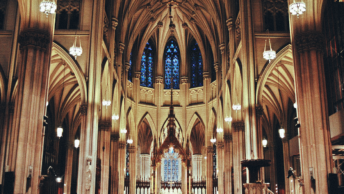Lent and freedom undergo the same route. I came to realize this fact when I read the message for Lent of Pope Francis for this year, 2024, which is entitled: Through the Desert God Leads us to Freedom. The Holy Father wrote: Lent is the season of grace in which the desert can become once more – in the words of the prophet Hosea – the place of our first love (cf. Hos 2:16-17). God shapes his people, he enables us to leave our slavery behind and experience a Passover from death to life. Like a bridegroom, the Lord draws us once more to himself, whispering words of love to our hearts.
The undertones of what he wrote pinpoint to the fact that we all need to be freed from the bondage of sin. But this freedom cannot occur haphazardly. It needs to be watered continually by spiritual combat. In his inspiring homily on Ash Wednesday of March 1, 2006, Pope Benedict beautifully explained this very important point when he taught us: Lent reminds us, therefore, that Christian life is a never-ending combat in which the “weapons” of prayer, fasting and penance are used. Fighting against evil, against every form of selfishness and hate, and dying to oneself to live in God is the ascetic journey that every disciple of Jesus is called to make with humility and patience, with generosity and perseverance.
It is precisely this penitential aspect of Lent which helps us move towards that much sought freedom we all deep inside ourselves feel attracted to follow. During his homily at Holy Mass, blessing and imposition of the ashes on Ash Wednesday of 6 February 2008, Pope Benedict said: If Advent is the season par excellence that invites us to hope in the God-Who-Comes, Lent renews in us the hope in the One who made us pass from death to life. Both are seasons of purification – this is also indicated by the liturgical colour that they have in common – but in a special way Lent, fully oriented to the mystery of Redemption, is defined the “path of true conversion” (cf. Collect).
There can be no Lent without the dire need for purification. Lent and the effort for purification go together. That is why in the message for this Lent Pope Francis suggests to us an iter of purification. The first step for this purification process is having the desire and courage to open our eyes to reality. Pope Francis says: When the Lord calls out to Moses from the burning bush, he immediately shows that he is a God who sees and, above all, hears: “I have observed the misery of my people who are in Egypt; I have heard their cry on account of their taskmasters. Indeed I know their sufferings, and I have come down to deliver them from the Egyptians, and to bring them up out of that land to a good and broad land, a land flowing with milk and honey” (Ex 3:7-8). Today too, the cry of so many of our oppressed brothers and sisters rises to heaven. Let us ask ourselves: Do we hear that cry? Does it trouble us? Does it move us? All too many things keep us apart from each other, denying the fraternity that, from the beginning, binds us to one another.
The second step is keeping in our hearts and minds that Lent is a season of conversion, a time of freedom. Pope Francis tells us: Jesus himself, as we recall each year on the first Sunday of Lent, was driven into the desert by the Spirit in order to be tempted in freedom. For forty days, he will stand before us and with us: the incarnate Son. Unlike Pharaoh, God does not want subjects, but sons and daughters. The desert is the place where our freedom can mature in a personal decision not to fall back into slavery. In Lent, we find new criteria of justice and a community with which we can press forward on a road not yet taken.
The third step is being aware that Lent intrinsically implies a struggle. The Holy Father reminds us that both the book of Exodus and the temptations of Jesus in the desert make clear to us this reality. Moreover, the Pope says: The voice of God, who says, “You are my Son, the Beloved” (Mk 1:11), and “You shall have no other gods before me” (Ex 20:3) is opposed by the enemy and his lies. Even more to be feared than Pharaoh are the idols that we set up for ourselves; we can consider them as his voice speaking within us. To be all-powerful, to be looked up to by all, to domineer over others: every human being is aware of how deeply seductive that lie can be. It is a road well-travelled. We can become attached to money, to certain projects, ideas or goals, to our position, to a tradition, even to certain individuals. Instead of making us move forward, they paralyze us. Instead of encounter, they create conflict. Yet there is also a new humanity, a people of the little ones and of the humble who have not yielded to the allure of the lie. Whereas those who serve idols become like them, mute, blind, deaf and immobile (cf. Ps 114:4), the poor of spirit are open and ready: a silent force of good that heals and sustains the world.
The fourth step is acting by pausing. Pope Francis says that to pause in prayer, in order to receive the word of God, to pause like the Samaritan in the presence of a wounded brother or sister. Love of God and love of neighbour are one love. Not to have other gods is to pause in the presence of God beside the flesh of our neighbour. For this reason, prayer, almsgiving and fasting are not three unrelated acts, but a single movement of openness and self-emptying, in which we cast out the idols that weigh us down, the attachments that imprison us. Then the atrophied and isolated heart will revive. Slow down, then, and pause! The contemplative dimension of life that Lent helps us to rediscover will release new energies. In the presence of God, we become brothers and sisters, more sensitive to one another: in place of threats and enemies, we discover companions and fellow travelers. This is God’s dream, the promised land to which we journey once we have left our slavery behind.
The fifth step for this purification to come about is taking countercurrent communitarian decisions. The Pope explicates that it is not that important if these decisions are small and large. The most important thing is that these decisions are taken. Further down in his message he explains the nature of these decisions when he writes: Decisions capable of altering the daily lives of individuals and entire neighbourhoods, such as the ways we acquire goods, care for creation, and strive to include those who go unseen or are looked down upon. Within this context the Pope says: I invite every Christian community to do just this: to offer its members moments set aside to rethink their lifestyles, times to examine their presence in society and the contribution they make to its betterment. Then he rightly warns: Woe to us if our Christian penance were to resemble the kind of penance that so dismayed Jesus. To us too, he says: “Whenever you fast, do not look dismal, like the hypocrites, for they disfigure their faces so as to show others that they are fasting” (Mt 6:16). Instead, let others see joyful faces, catch the scent of freedom and experience the love that makes all things new, beginning with the smallest and those nearest to us. This can happen in every one of our Christian communities.
Are we bold enough to take these five steps and let them change our way of living from one serving idols to one who gives itself to the true God of freedom?








